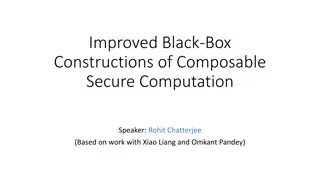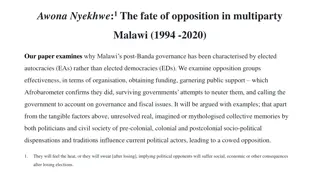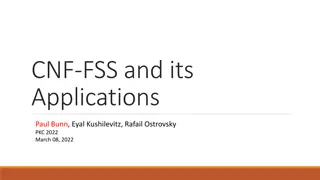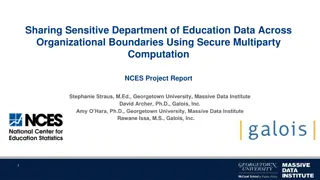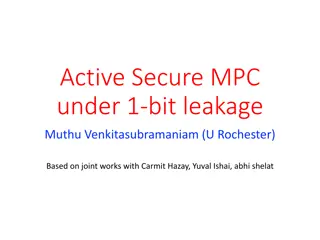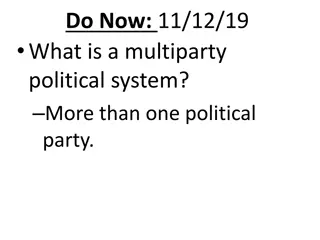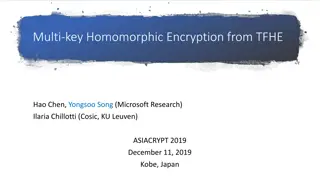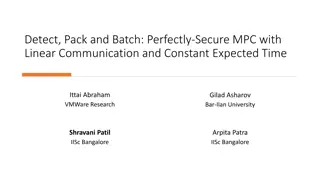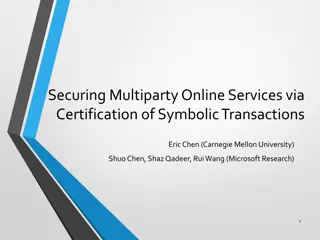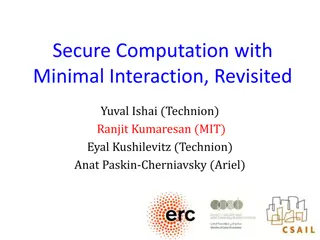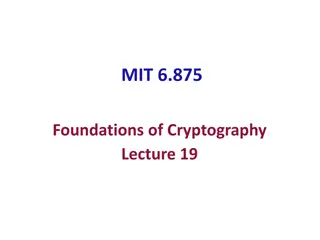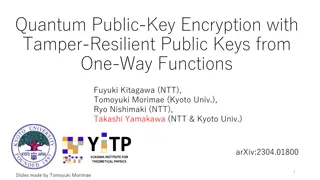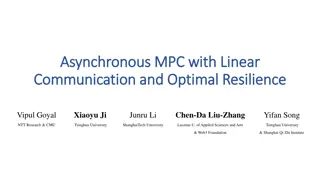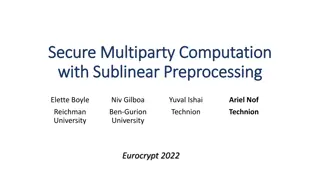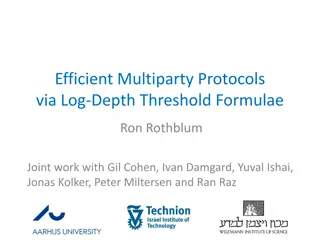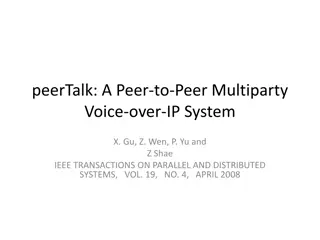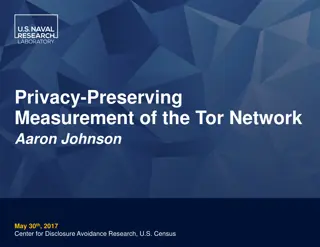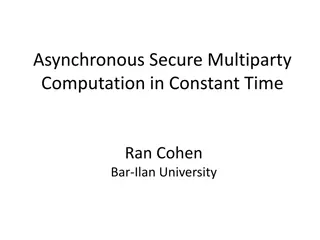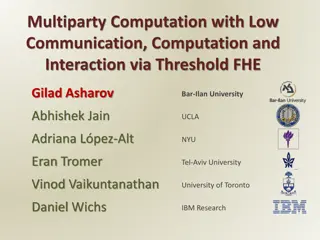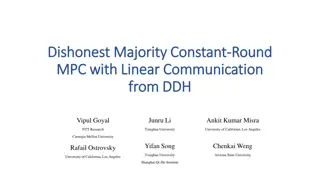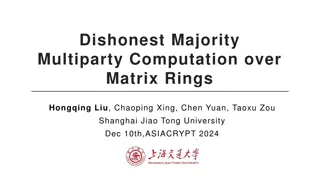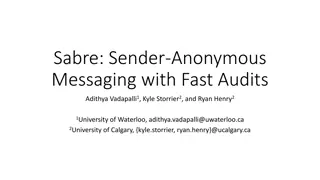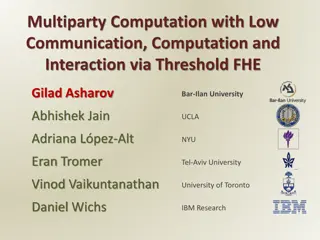Revisiting the Spymasters: The Double Agent Problem
Delve into the intriguing world of spymaster tactics with a focus on the double agent problem and the feasibility of secure multiparty computation protocols. Explore motivations, related works, and groundbreaking results in this complex domain.
8 views • 20 slides
Enhanced Security in Multiparty Computation
Explore the improved black-box constructions of composable secure computation, focusing on definitions, objectives, and the formalization basics of multiparty computation (MPC). Learn about the motivating security aspects in MPC and the real/ideal paradigm. Discover how MPC security involves compari
2 views • 68 slides
The Fate of Opposition in Multiparty Malawi: 1994-2020
This paper explores why Malawi's governance post-Banda has been dominated by elected autocracies rather than democracies. It delves into the effectiveness of opposition groups in terms of organization, funding, public support, and resilience against government attempts to suppress them. The influenc
4 views • 6 slides
CNF-FSS and Its Applications: PKC 2022 March 08
Explore the Background, Applications, and Summary of CNF-FSS, focusing on Function Secret Sharing, Distributed Point Function, CNF Key-Sharing, and more. Learn about the efficiency of multiparty sharing and 1-out-of-3 CNF-FSS constructions for certain classes of functions. Discover how CNF Key-Shari
5 views • 33 slides
Secure Multiparty Computation for Department of Education Data Sharing
This report discusses the use of Secure Multiparty Computation (SMC) to enable sharing of sensitive Department of Education data across organizational boundaries. The application of SMC allows for joint computation while keeping individual data encrypted, ensuring privacy and security within the Nat
2 views • 15 slides
Advancements in Active Secure Multiparty Computation (MPC)
Delve into the realm of secure multiparty computation under 1-bit leakage, exploring the intersection of DP algorithms, MPC, and the utilization of leakage for enhanced performance. Discover the overhead implications of achieving active security, as well as the evolution of secure computation protoc
1 views • 43 slides
Secure Multiparty Computation: Enhancing Privacy in Data Sharing
Secure multiparty computation (SMC) enables parties with private inputs to compute joint functions without revealing individual data, ensuring privacy and correctness. This involves computations on encrypted data using techniques like homomorphic encryption for scenarios like e-voting. SMC serves as
6 views • 27 slides
Evolution of the American Political Landscape: A Historical Overview
Explore the development of the multiparty political system in the United States through the origins of the Democratic and Republican parties, tracing back to historical figures like Thomas Jefferson, James Madison, and Abraham Lincoln. Dive into the ideological spectrum, party histories, presidentia
1 views • 32 slides
Advancements in Multi-Key Homomorphic Encryption Using TFHE
Revolutionary research has led to the development of Multi-Key Homomorphic Encryption (MKHE) from TFHE, enabling secure and efficient computations on encrypted data. This technology offers advantages such as dynamic operability, stronger security, and minimized interaction, making it an ideal soluti
1 views • 20 slides
Linear Communication in Secure Multiparty Computation for Efficient and Fast Processing
The research focuses on achieving perfectly secure multiparty computation (MPC) with linear communication and constant expected time. It explores efficient approaches using a broadcast-hybrid model and P2P communication, aiming to balance speed and efficiency in MPC. The study highlights the importa
1 views • 23 slides
Enhancing Online Service Security through Symbolic Transaction Certification
The research discusses securing multiparty online services through the certification of symbolic transactions, addressing logic flaws and the importance of program verification. The Certification of Symbolic Transaction (CST) approach is presented as an effective way to verify system-wide properties
2 views • 22 slides
Insights into Secure Computation with Minimal Interaction
This paper revisits the concept of secure computation with minimal interaction, focusing on the challenges and possibilities of achieving secure multiparty computation in 2 rounds. Specifically exploring scenarios with 3 and 4 parties, the study delves into the reasons for choosing n=3, n=4, and t=1
4 views • 23 slides
Foundations of Cryptography: Secure Multiparty Computation
Explore the foundations of cryptography with insights into secure multiparty computation, including the Secure 2PC from OT Theorem and the Two-Party Impossibility Theorem. Delve into the impossibility of 2-Party Secure MPC, claims, and exercises on extending to statistical security. Learn about redu
1 views • 39 slides
Quantum Public-Key Encryption with Tamper-Resilient Public Keys
Explore the concept of Quantum Public-Key Encryption with Tamper-Resilient Public Keys from One-Way Functions. Learn about the essentials of Public-key Encryption (PKE), computational assumptions, and the implications of realizing PKE from OWFs in the quantum world. Delve into topics like statistica
4 views • 20 slides
Overview of Asynchronous MPC with Linear Communication and Optimal Resilience
Explore the concepts of Asynchronous Multiparty Computation (MPC) with Linear Communication and Optimal Resilience, discussing the model, motivation, and differences between synchronous and asynchronous protocols. The goal is to ensure correctness and privacy in a setting where parties may be corrup
4 views • 72 slides
Secure Multiparty Computation with Sublinear Preprocessing
Secure Multiparty Computation with sublinear preprocessing allows parties to jointly compute arithmetic circuits over private inputs with malicious security in a dishonest majority setting. The online execution involves the dealer generating correlated randomness, preprocessing, and cryptographic ou
2 views • 30 slides
Fast Secure Computation for Small Population over the Internet
Efficient 3-Party and 4-Party protocols with honest majority, achieving strong security notions. Secure MultiParty Computation (MPC), joint function f(x1, x2, .., xn) with goals of correctness and privacy. Real-world applications in Secure ML, auctions, and more. Explore why small populations with h
5 views • 13 slides
Efficient Multiparty Protocols via Log-Depth Threshold Formulae
Secure Multiparty Computation (MPC) allows multiple players to jointly perform computational tasks securely. Feasibility results show perfect security in specific scenarios. This work proposes a novel approach using player emulation to design efficient MPC protocols, simplifying existing complex pro
0 views • 35 slides
PeerTalk: A Peer-to-Peer Multiparty Voice-over-IP System
This paper discusses "PeerTalk," a peer-to-peer multiparty voice-over-IP system proposed by Gu, Wen, Yu, and Shae. The system aims to facilitate voice communication among multiple parties in a decentralized manner. The study, published in IEEE Transactions on Parallel and Distributed Systems in Apri
0 views • 17 slides
Two Round MPC via Multi -Key FHE
Explore the innovative approach of Two-Round MPC via Multi-Key FHE proposed by Daniel Wichs from Northeastern University in collaboration with Pratyay Mukherjee. This joint work introduces a novel protocol for secure multiparty computation, enhancing privacy and efficiency in data sharing scenarios.
2 views • 17 slides
Privacy-Preserving Measurement of the Tor Network Study Summary
This study conducted by Aaron Johnson on May 30th, 2017 at the Center for Disclosure Avoidance Research delves into the intricacies of the Tor network. It focuses on the anonymous and censorship-resistant communication system, exploring the number of users, connections, and traffic volume. The use o
0 views • 39 slides
Secure Multiparty Computation and Communication Models for Asynchronous Security
Explore the world of secure multiparty computation and communication models tailored for asynchronous security scenarios, where intelligence agencies must collaborate to stop a terrorist threat. Learn about the essential security requirements, simulation-based security, communication models like poi
3 views • 21 slides
Multiparty Computation Using Threshold Fully Homomorphic Encryption
Explore the concept of multiparty computation with low communication and computation complexity through threshold fully homomorphic encryption. Advantages include reduced round complexity, low communication requirements, and independence of specific functions and inputs. Discover how this approach c
0 views • 35 slides
Efficient Fully Malicious Multiparty Computation Protocol
Explore the construction of a fully malicious Multiparty Computation protocol in the dishonest majority setting, aiming for constant rounds and linear communication complexity. Delve into known literature results and communication-efficient protocols for secure computation scenarios.
2 views • 41 slides
Secure Multiparty Computation for Highly Repetitive Circuits
Explore the advancement in secure multiparty computation for highly repetitive circuits, presenting efficient protocols, comparisons with existing methods, focusing on Single Instruction Multiple Data (SIMD) circuits, and proposing protocols for a broader range of circuits. Discover implementations
2 views • 11 slides
Asynchronous Agreement on a Core Set
Efficient asynchronous VSS and MPC protocols for achieving agreement on a core set in constant time. Dive into network and adversary models, challenges, and optimal resilience strategies. Delve into asynchronous multiparty computation and the state-of-the-art advancements in agreement protocols. Dis
4 views • 11 slides
Efficient Multiparty Computation for Matrix Rings against Malicious Adversaries
Explore the development of efficient multiparty computation protocols for non-commutative rings, specifically focusing on matrix rings, in the dishonest majority setting to combat malicious adversaries. This study, presented at ASIACRYPT 2024, delves into the significance of utilizing matrix rings i
5 views • 19 slides
Secure Messaging and Multiparty Computation Techniques
Explore Sabre anonymous messaging and secure multiparty computation protocols for enhanced data privacy and security. Learn about additive secret sharing techniques for secure data transfer and computation.
1 views • 53 slides
Multiparty Computation with Threshold Fully Homomorphic Encryption
Explore the concept of Multiparty Computation with low communication complexity and independent computation, featuring Threshold Fully Homomorphic Encryption. Learn about advantages such as low round complexity and communication complexity, as well as the implementation of Threshold Key Generation,
1 views • 35 slides
PeerTalk: Decentralized VoIP System Design
Explore the innovative design of peerTalk, a decentralized Peer-to-Peer Multiparty Voice-over-IP system. Learn about its Decoupled Distributed Processing model, self-organizing capabilities, and service provisioning protocol. Discover how mixer splitting, merging, migration, and replication optimize
1 views • 17 slides

